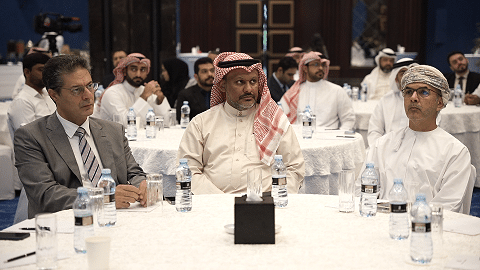The Information and eGovernment Authority (iGA), in collaboration with Microsoft, organized a workshop on harnessing low-code and no-code programming tools using artificial intelligence (AI) via Microsoft’s platform. Bringing together 100 IT professionals from governmental and semi-governmental entities in the Kingdom, the workshop showcased digital solutions and features that support the development of government eServices and applications.
This workshop is part of the iGA’s ongoing efforts to enhance government operations and services and support national initiatives aimed at accelerating digital transformation in line with Bahrain Vision 2030. Its goal is to make use of low-code and no-code software development tools, making the process of creating applications and websites faster and more efficient without the need for in-depth coding expertise. This is intended to improve the efficiency of the public sector, boost productivity, and enable the rollout of additional digital government applications supported by Microsoft’s Power Platform.

iGA Deputy Chief Executive of Operations and Governance, Dr. Khalid Almutawah underscored the government’s commitment to adopting advanced technologies and digital solutions for its operations. He stressed that within the framework of the directives and follow-up of His Excellency General Shaikh Rashid bin Abdullah Al Khalifa, Minister of Interior, Chairman of the Ministerial Committee for Information and Communication Technology (MCICT), the Authority is working to achieve this by implementing the recommendations of the Committee to employ modern technical applications in the government sector.
He highlighted the significance of utilizing AI applications for data processing, decision-making, and future planning. Recognizing this, the committee established by the Kingdom recommends the use of AI applications for the public good, while maintaining appropriate governance and controls that ensure transparency and accountability.
Dr. Almutawah further emphasized the global significance of AI and its applications, especially in leveraging data for machine learning, which has brought about radical changes in global economic and social systems. The iGA’s focus on digital tools in the creation and development of government applications is evident through various initiatives and service projects, which are supported by AI and modern cloud computing.
He also pointed out the key benefits of adopting low-code and no-code development platforms, including the acceleration and simplification of the development process, a reduction in the time and effort required to build applications, and the empowerment of non-developer users such as designers, managers, and end-users to create applications without deep coding knowledge. This approach enhances collaboration between development teams and end-users.
Microsoft Bahrain and Oman General Manager, Shaikh Saif Hilal Al Hosni said that the artificial intelligence solutions and Power Platform technology from Microsoft will enable the Government of Bahrain and the concerned authorities and ministries to implement internal and external programs using low-code solutions to create effective and flexible applications in a short time and link them to other applications and systems in an easy and direct way, and, it will help to issue accurate reports and statistics in addition to the visual representation of information and data.
iGA and Microsoft experts showcased a wide range of solutions offered by AI applications and low-code and no-code programming tools, which support government entities in harnessing the power of smart cloud computing to enhance services, increase efficiency, reduce costs, and address challenges. Successful and inspirational case studies were showcased, with government organizations and specialists given the chance to inquire about the transition to low-code and no-code platforms and how to leverage them for the development of software and service systems.

